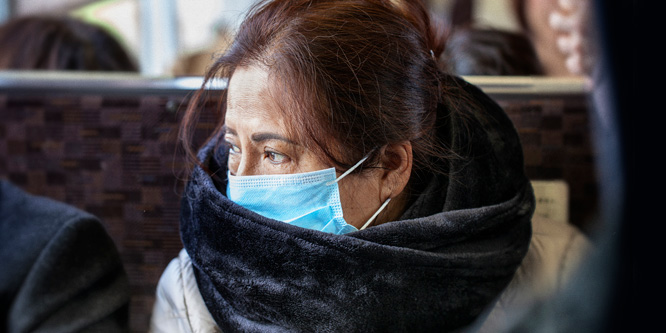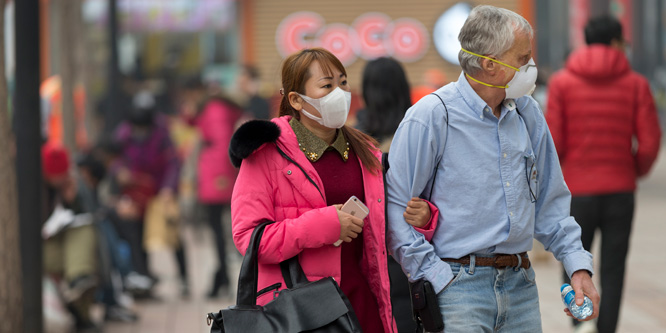
Photo: Getty Images/Spondylolithesis
Are retailers ready for the coronavirus?
The Centers for Disease Control and Prevention issued an update earlier this week on the spread of the coronavirus, known as 2019-nCoV, from Wuhan, China to the U.S. and other countries.
To date, five patients in the U.S. have tested positive for the virus, while 32 were negative and 73 others are still awaiting confirmation. States with confirmed cases of the virus include Arizona, California, Illinois and Washington. People infected with the virus have symptoms including fever, cough and shortness of breath. Symptoms may appear anywhere from two to 14 days after exposure.
In China, the number of people infected with the virus is now listed at more than 6,000. Of those, 132 have died.
Concerns about a global outbreak of the virus have been blamed for turmoil in financial markets in recent days. The Dow Jones industrial average fell 267 points in trading on Monday.
American businesses have begun restricting travel to China and arranged charter flights to bring U.S. citizens home.

U.S. companies operating stores in China are taking steps to address the virus. Starbucks has temporarily closed more than 2,000 of its locations. The coffee giant has cautioned that the coronavirus outbreak in China could “materially affect” its results this year.
Apple is another company with a sizable footprint in China, including factories and retail.
“We’ve currently closed one of our retail stores and a number of channel partners have also closed their storefronts,” said Apple CEO Tim Cook on the company’s first-quarter earnings call yesterday. “Many of the stores that remain opened have also reduced operating hours. We’re taking additional precautions and frequently deep-cleaning our stores as well as conducting temperature checks for employees.”
The CDC has offered preventative actions to help reduce the spread of the coronavirus and other viruses. Number one on the list is for people to wash their hands with soap and water for at least 20 seconds. If soap and water are not available, the agency recommends alcohol-based sanitizers. Cleaning and disinfecting frequently touched surfaces is also recommended by the CDC.
Based on past experience with viral outbreaks, retailers can expect higher demand for soaps, sanitizers and household cleaning supplies.
In a note to clients, Evercore ISI analyst Omar Saad said L Brands, which operates Bath & Body Works, stood to benefit from concerns about the virus. Mr. Saad said the retailer could see a lift in same-store sales between two and four percent as concerned consumers buy more soap and sanitizers. He pointed to the uptick the company saw in sales during the 2009 outbreak of the H1N1 swine flu as analogous to the current situation.
- 2019 Novel Coronavirus (2019-nCoV) in the U.S. – Centers for Disease Control and Prevention
- About 2019 Novel Coronavirus (2019-nCoV) – Centers for Disease Control and Prevention
- Prevention & Treatment – Centers for Disease Control and Prevention
- Deaths rise to 132 in China outbreak as foreigners leave – The Associated Press/MSN
- Apple Inc. (AAPL) CEO Tim Cook on Q1 2020 Results (Earnings Call Transcript) – Seeking Alpha
- Starbucks outpaces earnings estimates but warns coronavirus could hit fiscal 2020 – CNBC
- Bath & Body Works’ owner could see sales of hand sanitizer and soap rise as deadly coronavirus spreads – CNBC
Discussion Questions
DISCUSSION QUESTIONS: What would you say is the current state of readiness among American retailers and restaurant operators for an outbreak of the coronavirus or other easily spread viruses? What steps should retailers be taking now to address the situation?


Specifically speaking to American retailers and restaurant operators in America – What steps can they take? More data is needed to see if a response is warranted. In the meantime, wash hands, clean surfaces, and prepare food to proper specifications — the stuff they should be doing anyway.
Normally in chaos there is an opportunity, but retailers should tread carefully as the concerns around the coronavirus increase. Trust and transparency matter and retailers should raise awareness about the seriousness of this matter with their store associates as well as consumers. While a cure is far off, everyone has to collectively take measures to ensure that there is containment and preventive measures in place to help mitigate spreading the virus further.
It is commendable to see the concrete steps that the Chinese government is taking to help contain the virus. We should expect a higher level of awareness and education around preventive measures to help contain the virus in the U.S. Washing hands and taking sanitary measures is fundamental, however it has to be enforced by all institutions.
From what I’ve heard, no one was ready for this. No vaccine, no treatment. Now the world is reacting and learning more each day as the virus spreads globally. Even basic, disposable face masks are questionable in their effectiveness. Bottom line for retailers, exhibit hygiene sanitation practices with staff and inform staff of a prepared statement for when shoppers question them.
The readiness of American retailers and restaurant operators is no better or worse than that of any other developed country. Meaning it has not been top of mind nor are the vast majority of businesses adequately prepared for it as part of a business disaster recovery plan. Retailers and restaurants need to look at this from the top of their organizations to the bottom. First and foremost, how do you stockpile cleaning and hygiene supplies across the supply-chain and in each retail location for employees and customers (as they enter the store)? Second, establish and enforce higher frequency cleaning of all spaces from retail floor space to supply-chain operations to corporate office space. Third, escalate and educate around policies for employees staying home when sick. Finally, a retailer better have a great action plan to address public perception if one or more of their retail locations has an employee virus outbreak.
So other than washing hands (what we have always been told to do) and keeping surfaces clean, what else is there to do? The masks apparently provide no protection and people can have symptoms but not have the actual virus. A vaccine is being developed but trials may not begin until the summer. I think there are a lot of unknowns still and until more is known, information being passed to retailers and food service businesses will be directional and sketchy (other than about the basic hygiene rules — which they should always be following).
I agree with Bethany that restaurants and retailers should be making sure that their policies and processes dealing with cleanliness and sanitation are being followed. We have explained to clients that retail clean is not restaurant clean. The standards are often lower due to the nature of the products they sell.
The other issue both need to deal with is their staffs. At this time of year employees often come to work when they are not feeling well because it’s just a cold or a little bit of the flu. I would encourage all companies to ask their employees if they are not feeling well not to come to work.
It’s hard to prepare for an airborne virus. The last update I read there were 6,000 cases in China and 130 deaths. It makes sense for retailers to respond there. In the U.S. the task is to ensure the small number of cases we have do not spread.
I did think twice before getting on a plane to Seattle yesterday, but there is little an individual can do, other than wash your hands a lot and disinfect surfaces.
Restaurants can hyper focus on cleanliness, that’s easy when we’re talking food prep. It’s tougher at retail because shoppers are in and out of stores all day long. Stressing hygiene is a given, it’s certainly a conversation management should have at store level.
I am hearing from former workmates in China. The steps being taken are draconian. Spring Festival extended for 10 days. People highly recommended to just stay at home and not travel. Do not even visit friends. Businesses shutting down as a result. Borders shutting down. Extensive travel restrictions. No business, town, city, or state is ready for something of this scale. Better an extreme abundance of caution in the absence of hard information. I don’t hear panic, just a frustrating acknowledgment that the caution is well advised.
If people become nervous about public gatherings (i.e. shopping malls) perhaps it’s time to overload customer fulfillment centers as more shoppers choose to buy online and forego the store visit.
To me, this is a major restaurant concern. The measures taken worldwide seem to be appropriate. The major issue I see is controlling this outbreak from secondary countries. China is one source and we seem to be dealing with that source appropriately, but when someone with the coronavirus comes to the United States from let’s say, Germany, who was infected in China could be undetected.
Today at Starbucks I saw and heard of corporate mandated process changes related to the virus. That gives me comfort to know retailers are taking this seriously.
The biggest issue here is likely to be a supply chain one. China’s factories play a key role in the global supply chain — either producing product we consume or producing components used in products made elsewhere. Should specific factories close for a period of time the knock-on implications could be huge. While the outbreak may cause have impact on certain channels or segments (online due to reduced desire for mall shopping, soaps, etc) the supply chain impact cannot be underplayed as it impacts everyone — no matter where they are in the world.
Having clear visibility as to where product and components are sourced from is a key way to understand the potential implications. The complex nature of the 2020 global supply chain cannot be underplayed. How many companies understand every perspective as to where their supply chains span to? You need this to understand potential impacts before you start planning.
American retailers are not ready for the coronavirus, because we don’t know what to expect or how to curtail the impact of the coronavirus. There is not a path of well-defined cause and effect leading up to infection of the coronavirus, and how to stop it from spreading. Until they do, retailers, are very exposed and cannot be prepared for all of the different scenarios.
The question seems a bit unfair: how can any retailer or person even ever really be “ready” for an unknown pathogen? If we mean the usual bromides — having “a plan ready” — then no, most probably don’t have one. But I’m hardly convinced such is necessary or even useful. Take the usual precaution of maintaining cleanliness standards and pray that some former customer doesn’t end up coming down sick. Even if you’re completely innocent — and you likely will be — you’ll be caught up in the backlash.
Readiness for an outbreak of the coronavirus or any other virus catastrophe takes advance planning, and even then you won’t know if it works until it actually happens. Look at history and evaluate how business dealt with different issues from economic to war to medical, etc. Discuss multiple plans. When one of these catastrophes hit, there’s no guarantee you’ll be prepared, but at least you’ll have done some advanced planning.